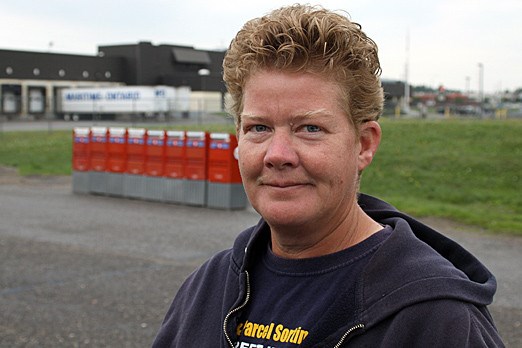The mail may return as soon as Tuesday, but postal workers say they’ve already received their message from the federal government.
Wendy Johnston, president of the Canadian Union of Postal Workers Local 620, said that message is that postal workers lose their rights because of government intervention.
"This is a clear message to all labour unions to lookout," Johnston said Monday. "This is a shot over the bow and like the saying goes ‘it’s not over, it’s just the beginning.’ Canada Day will be really different this year. I feel like some of my rights have been taken away from me. All I can point the figure to is (Prime Minister Stephen) Harper."
During a rare Sunday sitting, senators vigorously debated — but ultimately approved — a bill that sets the stage for resumption of mail service.
The legislation received royal assent hours later.
The government tabled the back-to-work legislation last Monday after Canada Post locked out the union in the midst of rotating strikes that began earlier this month. After a 58-hour marathon filibuster in the House of Commons, the Conservative benches erupted in cheers after MPs passed the bill Saturday night.
But for many postal workers, going back to work is bitter sweet.
"It’s a bitter pill to swallow today," Johnston said. "We feel let down by the government because they put things in motion that are unprecedented. Canada Post had no intentions of negotiating from the beginning back in October. They were just playing with us and that set us up for the back to work legislation."
Canada Post and the labour union still need to go through arbitration, which could not happen for another 90 days. The arbitrator will then choose one of two proposals presented by both parties.
Johnston said the matter is now out of their hands.
"We’re totally uncertain on what’s going to happen," she said. "We’re assuming that we’re going in under our old contracts so operations can run smoothly."
Labour Minister Lisa Raitt told the senators the government acted to preserve Canada's economy.
"This is not our first choice in how we would like to see this labour dispute resolved, but the choice is a necessary one," she said.
"Our citizens cannot afford to be left waiting."
Asked if back-to-work legislation would become a standard Conservative approach to labour disruptions, Raitt said, "If it is a matter of national public interest, the government will intervene."
Once the Tory-dominated Senate passed the bill 53-26, Raitt made no apologies for wading into the dispute after mere weeks.
"We did not intervene too quickly at all. There was a work stoppage that affected the national economy," she told reporters.
"You can't resort to hurting the national economy as a way in which to resolve your internal disputes."
The legislation actually provides members of the CUPW slightly lower wages than the last offer from the post office. It also limits an arbitrator to choosing between the final offers the two negotiating parties on other matters.
Talks between the two sides collapsed late Wednesday, and a final half-hour discussion Saturday morning failed to close the gap.
— With files from the Canadian Press
Sign in or register
- Messages
- Post a Listing
- Your Listings
- Your Profile
- Your Subscriptions
- Your Likes
- Your Business
- Support Local News
- Payment History
Registered Users
Already have an account?
New Users
Create a free account.
